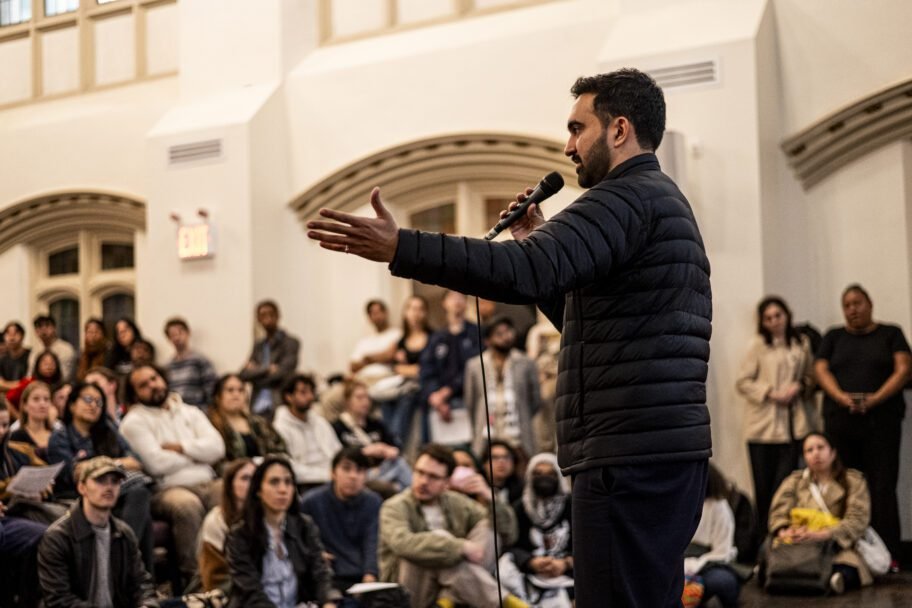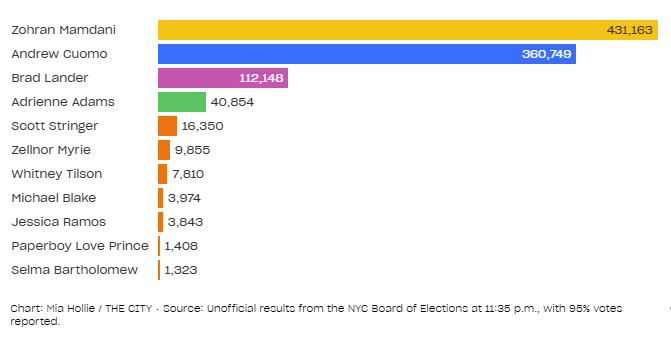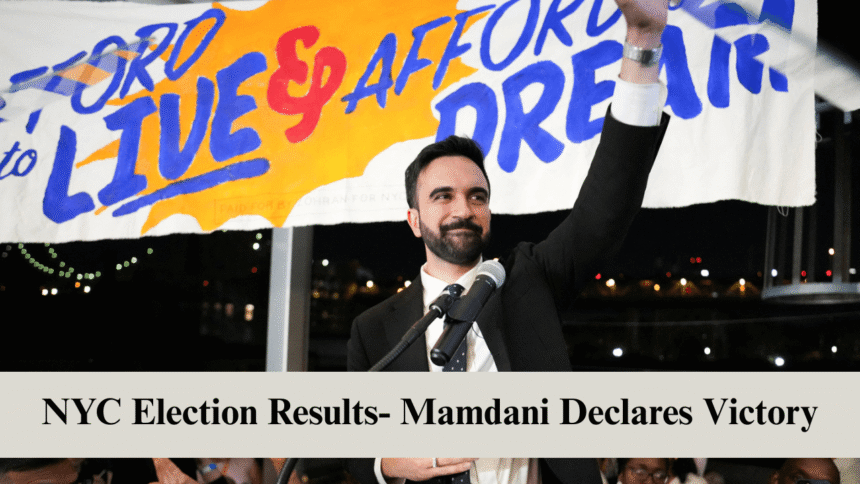The NYC election results have sent shockwaves through the Democratic establishment as Zohran Mamdani officially declared victory in a dramatic and closely watched primary contest. With a bold, grassroots campaign that energized young voters and diverse communities, Mamdani has emerged as the face of a new political movement. His victory marks a significant moment in the city’s evolving political landscape.
The win comes as a surprise to many longtime observers of New York politics. Former Governor Andrew Cuomo, once considered a dominant figure in state leadership, failed to reclaim his influence in this race. The NYC election results have made it clear: the city is undergoing a profound generational and ideological shift.
Mamdani’s Rise from the Ground Up
Zohran Mamdani, a first-generation American and Democratic Socialist, ran a campaign fueled by passion and policy. He focused on issues like affordable housing, universal healthcare, and climate justice—policies he described as necessary, not radical.

His campaign didn’t rely on corporate money or flashy advertisements. Instead, it was built on the power of community organizing. Volunteers canvassed neighborhoods, made phone calls, and rallied at subway stations, creating a groundswell of support that proved unstoppable.
Mamdani’s message resonated particularly with young voters and working-class families. His win reflects a city more eager than ever to embrace fresh leadership and transformative ideas.
Cuomo’s Concession: End of an Era?
Once considered a fixture of New York politics, Andrew Cuomo conceded the race with a brief and direct statement. The former governor had hoped to rebuild his political image after past controversies, but the NYC election results suggest that voters preferred change over a return to the old guard.
Cuomo’s campaign was largely centered on experience, stability, and his past leadership during times of crisis. Yet, many voters felt disconnected from his message. The results showed that endorsements, name recognition, and political legacy weren’t enough to win this time around.
A New Democratic Order
The results point to a broader transformation within the Democratic Party. Mamdani’s win wasn’t just a personal victory—it was a signal that progressive politics are gaining stronger ground in major urban areas.
Democratic insiders are already analyzing what this means for future city and state elections. Candidates who once distanced themselves from progressive labels may now feel pressured to shift their platforms. The momentum that began with grassroots figures a few years ago is now fully reshaping the political field.
Political analysts note that Mamdani’s strategy combined clear messaging with strong digital outreach, local partnerships, and tireless volunteer coordination. It’s a model that may define winning campaigns in future NYC races.
Voter Turnout and Community Impact
Another significant takeaway from the NYC election results is the increase in voter turnout, especially in neighborhoods traditionally overlooked by mainstream campaigns. Young voters, immigrants, and first-time participants turned out in record numbers.
Polling stations in Queens and parts of Brooklyn saw lines that stretched down blocks. Community groups played a major role in getting out the vote, helping residents register, understand the ranked-choice system, and make their voices heard.
This election revealed that when communities are actively engaged and represented, democracy thrives. It also proved that voters are willing to show up—when they feel like their vote can truly make a difference.
The Power of Ranked-Choice Voting

This was the second citywide race using New York’s ranked-choice voting system, and it again played a pivotal role. Voters were allowed to rank up to five candidates, which encouraged broader engagement and more civil campaigning.
Mamdani led the pack in first-choice votes, but also gained significant second- and third-choice support. This broad appeal helped him secure a strong lead as the rankings were tallied. Candidates were forced to build coalitions and appeal to more than just a narrow base.
The system not only reduced negative campaigning but also created space for underdog candidates to rise. It showcased how new election methods can change not just how votes are counted, but how campaigns are conducted.
What’s Next for Mamdani?
With this victory, Mamdani now prepares to take on the general election, though his primary win has already positioned him as a likely frontrunner. If elected, he promises to bring transparency, inclusivity, and equity to city governance.
“Today, eight months after launching this campaign with the vision of a city that every New Yorker could afford, we have won,” he said. “I will be the mayor for every New Yorker, whether you voted for me, for Gov. Cuomo or felt too disillusioned by a long, broken political system to vote at all. I will fight for a city that works for you, that is affordable for you, that is safe for you.”
He’s expected to prioritize legislation around rent control, expanding public transportation access, and introducing climate initiatives. Supporters see him as a bold reformer; critics question whether his policies will be financially viable.
Mamdani, however, remains unfazed. He emphasized during his victory speech that he’s “ready to build a city for everyone, not just the wealthy few.” His confidence, clarity, and commitment are already setting the tone for a new era in city politics.
You may also like: Columbia Student Mahmoud Khalil Released After Judge Overrules ICE Detention
Voices from the Streets
Many residents expressed joy and hope after hearing the election results. Community centers erupted in cheers, and social media lit up with support for the new political star. Young voters, especially, felt empowered and heard.
“I’ve never felt this hopeful about New York’s future,” said Jameela Khan, a 22-year-old student from Astoria. “This was the first time I voted, and I really believe I made a difference.”
Others, like retired city worker Henry Lewis, noted the generational divide. “I’ve supported Cuomo in the past, but it’s time for someone new,” he said. “The city is changing, and our leaders should reflect that.”
Final Thoughts
The NYC election results have upended expectations and rewritten the political playbook. With Zohran Mamdani at the forefront, a fresh chapter begins—one driven by energy, equity, and engaged citizens.
As the city looks ahead, one thing is certain: the voices that were once at the margins are now leading the conversation. New York City, long a symbol of diversity and progress, is once again showing the nation what political transformation looks like.

